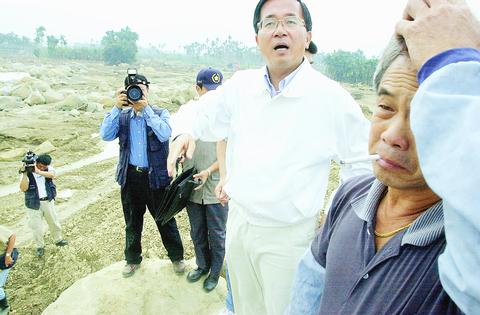Six days after Typhoon Toraji brought death and destruction to Taiwan, a visit by President Chen Shui-bian (陳水扁) to one of the severely affected areas yesterday highlighted political and legal difficulties that the government will face in its efforts both to facilitate recovery from the disaster and to prevent similar future catastrophes.
Chen flew aboard a helicopter to the mountainous villages of Chiayi County's Alishan township, where some 800 residents remained cut off by roads blocked by landslides.

PHOTO: CHEN CHENG-CHANG, TAIPEI TIMES
Tearful residents petitioned Chen for an immediate clean-up of gravel left by mudslides, which piled up along local river banks to heights of more than 10m during the typhoon, creating a further potential hazard in the event of more mudslides.
They also called upon the government to recycle the gravel as construction materials to enable the county to sell the gravel to fund local reconstruction work thereby helping to expedite its recovery.
The law, however, forbids the sale of gravel obtained from certain areas in the vicinity of -- among other places -- rivers and bridges, according to Minister of Economic Affairs Lin Hsin-yi (
Arriving later in the same area, Vice President Annette Lu (
Lu said that, as head of the presidential office's consultative committee on science and technology, she had been informed of Japanese technologies to recycle gravel to make household tiles. She said Taiwan should find ways to make good use of the gravel from the mudslides.
A soil and water conservation engineer, Debbie Weng (鄭麗瓊), told the Taipei Times that the government should start constructing what she called "detention pounds" at the confluence points of rivers prone to mudslides in order to capture gravel from the mudslides.
"The gravel can then be further filtered and recycled to become marketable as construction material," Weng said.
On Friday, Premier Chang Chun-hsiung (
But DPP legislative whip Lin Feng-hsi (
Echoing Lin's views, another DPP legislator, Tsai Huang-liang (
Tsai said that betel nut planting was just one of the causes of soil erosion and mudslides, and that he hoped that the Cabinet would conduct a further investigation before proposing measures that risked "sacrificing betel nut farmers' rights."
Lin said that the party's legislative caucus had scheduled a meeting with Chang and Council of Agriculture chairman Chen Chih-huang (
In addition, head of the Cabinet's typhoon reconstruction task force, Chen Chin-huang (
Head of the National Fire Administration, Chao Kang (

CHAOS: Iranians took to the streets playing celebratory music after reports of Khamenei’s death on Saturday, while mourners also gathered in Tehran yesterday Iranian Supreme Leader Ayatollah Ali Khamenei was killed in a major attack on Iran launched by Israel and the US, throwing the future of the Islamic republic into doubt and raising the risk of regional instability. Iranian state television and the state-run IRNA news agency announced the 86-year-old’s death early yesterday. US President Donald Trump said it gave Iranians their “greatest chance” to “take back” their country. The announcements came after a joint US and Israeli aerial bombardment that targeted Iranian military and governmental sites. Trump said the “heavy and pinpoint bombing” would continue through the week or as long

TRUST: The KMT said it respected the US’ timing and considerations, and hoped it would continue to honor its commitments to helping Taiwan bolster its defenses and deterrence US President Donald Trump is delaying a multibillion-dollar arms sale to Taiwan to ensure his visit to Beijing is successful, a New York Times report said. The weapons sales package has stalled in the US Department of State, the report said, citing US officials it did not identify. The White House has told agencies not to push forward ahead of Trump’s meeting with Chinese President Xi Jinping (習近平), it said. The two last month held a phone call to discuss trade and geopolitical flashpoints ahead of the summit. Xi raised the Taiwan issue and urged the US to handle arms sales to

State-run CPC Corp, Taiwan (CPC, 台灣中油) yesterday said that it had confirmed on Saturday night with its liquefied natural gas (LNG) and crude oil suppliers that shipments are proceeding as scheduled and that domestic supplies remain unaffected. The CPC yesterday announced the gasoline and diesel prices will rise by NT$0.2 and NT$0.4 per liter, respectively, starting Monday, citing Middle East tensions and blizzards in the eastern United States. CPC also iterated it has been reducing the proportion of crude oil imports from the Middle East and diversifying its supply sources in the past few years in response to geopolitical risks, expanding

An Emirates flight from Dubai arrived at Taiwan Taoyuan International Airport yesterday afternoon, the first service of the airline since the US and Israel launched strikes against Iran on Saturday. Flight EK366 took off from the United Arab Emirates (UAE) at 3:51am yesterday and landed at 4:02pm before taxiing to the airport’s D6 gate at Terminal 2 at 4:08pm, data from the airport and FlightAware, a global flight tracking site, showed. Of the 501 passengers on the flight, 275 were Taiwanese, including 96 group tour travelers, the data showed. Tourism Administration Deputy Director-General Huang He-ting (黃荷婷) greeted Taiwanese passengers at the airport and